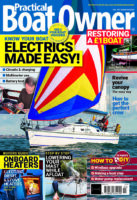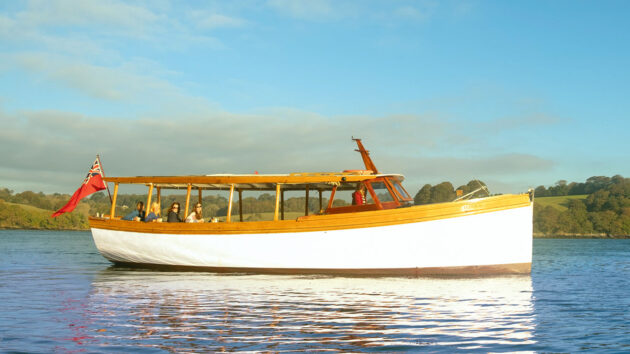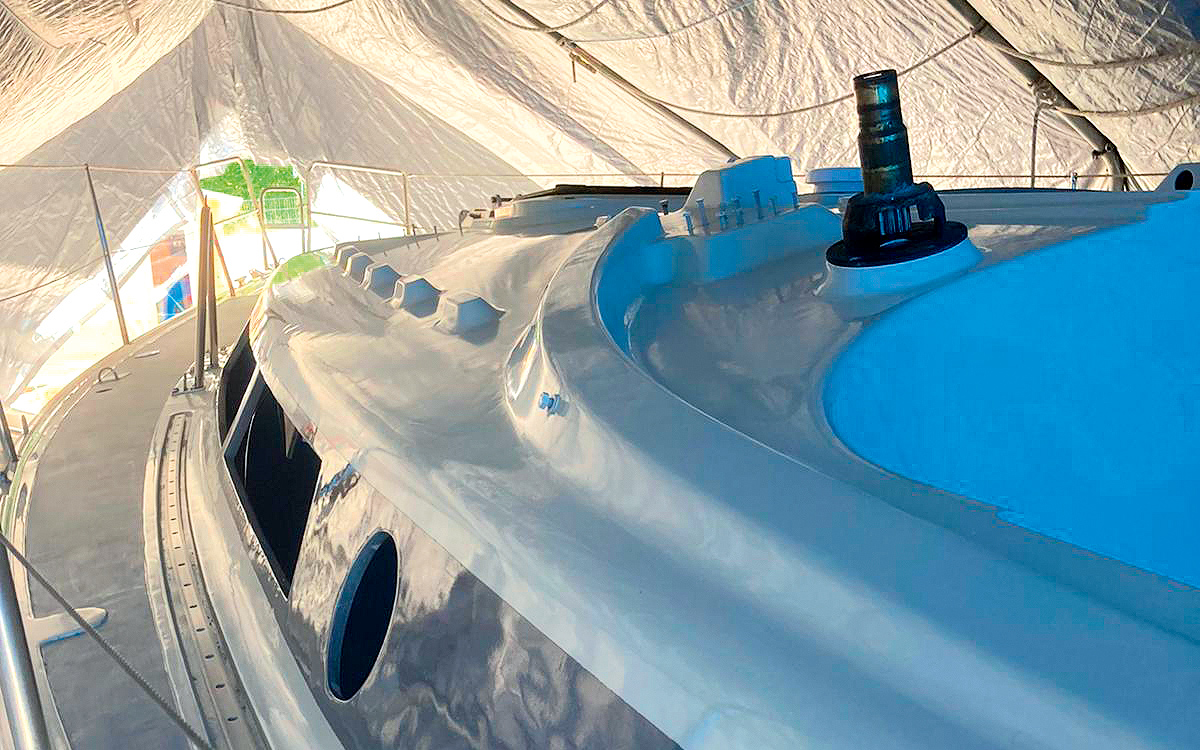Annie Means talks to the owners and restorers of a Cornish motor launch which is now used for dining afloat
Restoring Tethra: how a Looe fishing boat became a dining sensation
Blue River Table, a bespoke cruising and dining experience along the River Fal, is the brainchild of Charlotte Whyte and Jess Harris, who have transformed their decades-long friendship into a thriving business, writes Annie Means.
In the tight-knit Cornish maritime industry, it seems that every marine tradesperson knows one another. Boatbuilders rub shoulders with sailors, who enjoy the company of marine technicians, who know the local boatswains by first name.
But even in this amicable, laid-back sector, it’s rare to have a business partner who is also a close friend – rarer still to have known each other since the age of six.
As co-owners of Blue River Table, Whyte and Harris count themselves as part of that lucky in-crowd. Having grown up together aboard boats on the Penryn River, the two women became incredibly close – literally.
“We lived on opposite sides of the river and could shout across to each other,” recalls Whyte with a smile.

Dirty work: stripping Tethra’s old antifouling. Credit: Blue River Table
After spending their 20s and 30s sailing and working on boats around the globe, Whyte and Harris have returned to their roots along their home estuary.
Their business celebrates Cornish culture with a deep commitment to all things local, particularly the cuisine.
As captains and head chefs, Whyte and Harris guide guests through the breathtaking scenery of the River Fal, serving freshly prepared meals made with local ingredients.
With a fully licensed bar on board, the two co-owners provide a diverse dining experience, offering everything from brunch and lunch to afternoon tea and dinner.
Their dedication to locality likewise extends beyond the menu–it’s anchored in the very heart of their vessel.

All of the rotten planks and 30% of the oak framing had to be removed and replaced…Credit: Blue River Table
Their 36ft Cornish motor launch, Tethra, is the centrepiece of the Blue River Table experience –a boat the two women personally rebuilt and relaunched.
Along with skippering, marketing, and sourcing food for their company, Harris, Whyte, and their team of close friends and boatbuilders oversaw every aspect of Tethra’s redesign.
This is a relatively young enterprise, launched by the pair in 2018. The story of its founding is fitting, as the idea for their floating business was conceived on the very river they now cruise.
In 2017, Whyte, who had worked in the traditional boat world for almost two decades, had just rebuilt a wooden motor launch and was preparing to sell it.
On a sunny afternoon, she and Harris were out taking photos of the vessel on the River Fal when Harris turned to her with a spark of inspiration.

A much-needed paint job for Tethra. Credit: Blue River Table
“You know,” Harris said, “people would pay to come picnic on this.” And just like that, the seed was planted.
Whyte had already worked as a chef aboard traditional ships around the United Kingdom and could easily envision a unique dining experience in her home estuary.
With their combined years on the water (Harris has crossed the Atlantic three times and the Pacific once) and their culinary expertise, this idea perfectly merged the women’s passions.
Together, they began brainstorming. “And I thought, ‘It would be really cool if there could be a bar on board, and wouldn’t it be great if we could have a table to seat 12? Why don’t we have a proper galley so we can make everything fresh?’”
Ideas quickly spiralled, and Whyte admits, “By this point, it wasn’t really a small boat anymore.” Instead, the boat became Tethra.

Blue River Table is now in its sixth year and is licensed to operate in Falmouth and Helford. Credit: Blue River Table
Starting any new business is challenging, but launching one that floats comes with its own unique set of uncertainties, beginning with the first hurdle of acquiring a vessel to fit their needs and business model.
In their initial search, Whyte and Harris found Tethra’s sister ship before eventually locating her. They fell in love with the design and heritage of the boat, but the current custodian wasn’t willing to part with it.
Instead, “he put us in touch with the owner of Tethra,” said Whyte.
Upon visiting what would soon become their own boat, it quickly became apparent that extensive work was needed.
Built in 1971, Tethra was in dire need of some tender loving care.
While a more modern vessel might have afforded a faster business launch, the boat captivated the two partners.

Charlotte Whyte and Jess Harris had previous experience of boat restoration; the Tethra project took just six months to finish. Credit: Blue River Table
As locals, their choice was driven by a deep sense of Cornish pride, a passion for preserving tradition, and a little bit of aestheticism.
“The reason we chose Tethra over a glassfibre boat was that none of them [the other potential boats] were very pretty,” Whyte chuckled.
That logic is hard to dispute, especially when watching Tethra’s gleaming white hull slice through the water, her rebuild having restored her once-lost shine.
The boat likewise aligns perfectly with Whyte and Harris’ commitment to local connections. Put simply, Tethra is a true Cornwall native.
Crafted in Looe, just a few towns north of her current dock, Tethra’s commanding bow and sleek, curved lines reflect the tradition of Cornish fishing vessels.
After decades of longlining for mackerel and shark in the nearby area, she retired in the late 1980s.
By the time Harris and Whyte found her, the once-proud vessel had fallen into disrepair.
Though Whyte admits that choosing a wooden boat meant more work compared to a modern runabout, she and Harris were both well-equipped to handle the job – neither was green to shipwrighting.

At 36ft, Tethra was originally built by Curtis and Pape for longline mackerel fishing. Credit: Blue River Table
By the time Tethra came into the picture, Whyte had already built and sold six boats alongside her ex-partner.
For Harris, the craft is part of her roots. “My mum’s a boatbuilder and my dad’s a sailor, so it’s definitely in the blood,” she said.
Needless to say, neither woman was fazed by the rebuild; both were ready to dig in.
The vessel required a complete gutting, yet this offered the pair a rare opportunity: the freedom to rebuild Tethra from the ground up, allowing them to shape every detail exactly as they had envisioned.
“It [Tethra] made it better rather than just another boat that didn’t sort of add. And essentially, she was just the right shape,” Whyte explained.
For 182 days, the two co-founders and their team of friends, marine engineers, and craftspeople worked tirelessly, stripping and completely redesigning Tethra.
“We knew there would be things we didn’t know… but there were a lot,” recalls Whyte.
They enlisted the help of the local Cornish boatbuilding community, dividing the work into two main teams. One group focused on replanking the hull, framing, and installing the engine, while the two women took charge of refastening the entire boat, catching up on painting, and handling other essential tasks.
As the project progressed, the teams shifted. It was Harris’ mum who came on board to build the boat’s iconic centrepiece: the sleek chestnut banquet table, complete with a stylised river running through its centre.
Their friend Rory Bosher then joined to complete the intricate carpentry and add the finishing touches to the interior, bringing a new level of craftsmanship to the vessel.
The team was nothing if not efficient. “We bought the boat in December, started in January, and launched her in June,” said Whyte confidently.
All in all, from start to finish, the restoration took six months. Though the reconstruction of Tethra was incredibly extensive, the pair admits it was the most intuitive part of the process.
“The rebuild of the boat was the easiest part because we both knew what we were doing,” Whyte said.

The galley is located under the foredeck, along with the heads compartment. Credit: Blue River Table
Rather than raising alarms over nautical designs and precise measurements, Whyte and Harris found themselves more intimidated by the behind-the-scenes intricacies of starting a business.
Recaulking and refastening? Easy. Navigating licenses, mastering accounting and VAT returns? That was a whole new ballgame.
“But I think that was the most fun part because it was something we hadn’t already done. The rebuilding of the boat was challenging, but not like, ‘Whoa,’” emphasised Whyte.
Just as the two were remarkably efficient with their restoration, they proved equally adept at launching their business.
After six weeks of training aboard the vessel, on the day of their first charter, Channel 4 reached out to Blue River Table, eager to film their cruises for the TV series Devon and Cornwall.
Whyte, somewhat camera-shy, had reservations, but the duo eventually gave Channel 4 the green light to come aboard.
After the episode aired, Blue River Table was fully booked for the duration of its first summer.
It took a bit of time to iron out the kinks in their debut season.
Initially, the pair envisioned nonstop cruising. However, they soon realised that both they and their guests preferred leisurely stops for lunch, where they could drop the hook and enjoy the quiet tranquillity of the river. “For the first year, we pulled the anchor up hand over hand,” Whyte chuckled.
A windlass was soon their next business investment.
Since then, the pair have taken great pride in crafting a vessel capable of hosting intimate experiences; the food stays true to the boat’s sustainable, locally sourced mission, with nearly everything coming from within a five-mile radius of Mylor, where Tethra is moored.
Whyte and Harris have even contracted a local crabber to leave live catches submerged in a pot just for them.
“If we’ve got lunch, we’ll go out there in the dinghy, pull up the pot, and pull out live crabs to cook,” Whyte said.
When sourcing from Cornwall isn’t possible, the pair look to England; the wine comes from Europe.
Since launching, Whyte and Harris have hosted a range of events, from weddings and anniversaries to reunions, even hosting some of the fishermen who used to fish on board Tethra in her heyday.

Annie Means is a marine journalist covering global stories. In 2023 and 2024, she travelled the world as part of her Thomas J. Watson Fellowship, during which she explored and reported on women’s leadership in the international blue economy. Other notable work includes co-creating, producing, and editing the British Boat Builders Tour, a web series developed in collaboration with the Women in Boatbuilding network.
“What you’re trying to do is not necessarily be invisible, but to facilitate a really special memory for someone,” said Whyte. “I love hosting and making people feel welcome. Tethra truly fulfils that passion for me,” Harris reflects.
Now, nearly every season, the pair fields a waiting list. The team has streamlined its sustainable sourcing, and the restoration of Tethra is complete.
When asked about expanding their business, Whyte and Harris are adamant that their approach remains focused on bespoke experiences.
“We don’t want another boat. We’re really happy with Tethra,” said Whyte.
Just as every boat restoration is unique, so too is Blue River Table.
Restoring a boat? Beat the restoration blues and get back to work today
Procrastination is the art of busily doing nothing while another part of you gets really disappointed about it. I’m a…
How to cover a boat for winter: Top tips from a boat restoration expert
Opinions are divided when it comes to whether you should cover a boat for winter. Some say the boat is…
How to buy an old boat as a project – DIY yacht restoration advice
Growing up sailing on the East Coast it’s fair to say that I caught the bug pretty early on. Family…
Boat wood: a complete guide for yacht owners
Boatbuilder and finisher Lyndon March explains which types of wood work best for different repairs and modifications on board
Want to read more articles like this?

A subscription to Practical Boat Owner magazine costs around 40% less than the cover price.
Print and digital editions are available through Magazines Direct – where you can also find the latest deals.
PBO is packed with information to help you get the most from boat ownership – whether sail or power.
-
-
-
- Take your DIY skills to the next level with trusted advice on boat maintenance and repairs
- Impartial, in-depth gear reviews
- Practical cruising tips for making the most of your time afloat
-
-
Follow us on Facebook, Instagram, TikTok and Twitter








